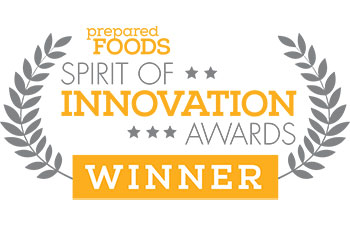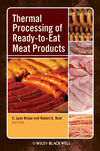SPIRIT OF INNOVATION AWARD WINNER
Applegate Evolves its Farm-to-Fork Commitment Toward Fundamental Sustainability
With Applegate Naturals Do Good Dog hot dogs, the company became one of the first to appeal to consumers on the basis of regenerative agriculture

Officials say Applegate Naturals Do Good Dog is the first grass-fed beef hot dog made from beef raised with certified practices that regenerate the land.
PHOTO COURTESY OF: Applegate Farms
Applegate has done things a little differently for more than 30 years. Within a vast prepared meats industry, this Bridgewater, N.J., company is committed to a mission—“Changing The Meat We Eat”—through its lines of natural and organic hot dogs, bacon, sausages, deli meats and more.
Last year saw Applegate take that farm-to-fork commitment to change one step further. With the October launch of Applegate Naturals Do Good Dog hot dogs, it became one of the first and few to appeal to consumers on the basis of regenerative agriculture.

JUDGES’ SELECTION:
Applegate Naturals Do Good Dog
Applegate Naturals Do Good Dog will be one of six noteworthy new products showcased this August in Prepared Foods’ Spirit of Innovation Awards. Pre-register for this FREE industrywide event!
“Consumers are inundated with messaging around meat and its contribution to climate change,” notes Gina Gancheva, Applegate Brand Director. “The meat industry is facing particularly strong backlash around [cattle] raising practices. However, regenerative agriculture and its ability to make positive impact on the land can help change that. Applegate’s Do Good Dog represents an opportunity for consumers to make change at the shelf by supporting a product as simple as a hot dog that is working to make positive impact—one small bite at a time.”
Gancheva says Applegate embraced a seven-month target (roughly March to October 2021) to develop the Do Good Dog. To break that work into better “bite” size pieces, Applegate formed two separate teams—a cross-functional group to work through formulation, raw supply sourcing and production; and the other team (including senior leadership) to work through complementary issues and goals of brand positioning (compared to Applegate’s other offerings), packaging, consumer messaging and marketing.
Here’s how Gancheva summarizes Applegate’s many activities.
Sourcing: Applegate tasked its quality assurance and raw supply teams to identify and onboard a new raw beef supplier, SunFed Ranch, Woodland, Calif. “This was our first time bringing on a supplier engaging in regenerative farming,” Gancheva notes. “It took a cross-functional group—including our Raw Supply team, QA, senior leadership, and our partner, The Savory Institute, to ensure that regenerative outcome verification was in place prior to our first receiving and/or use of any raw supply coming from SunFed Ranch. This large team engaged in weekly (if not more frequent) conversations around how to stay on track and complete audits, documentation and onboarding within a tight timeframe.
Sourcing, Part 2: Here’s how Applegate connects the dots. SunFed Ranch cattle are raised using a set of practices designed to restore soil health. These practices include managed grazing on grass, natural fertilization, no or low tilling, and the elimination of synthetic inputs into the land. Using these methods can reverse soil depletion, which is one the biggest concerns with and outputs of climate change. Among other things, soil depletion contributes to excessive carbon emissions into the atmosphere and drought. Restoring soil health can result in carbon sequestration (where carbon is captured into soil where it can support grass growth and microorganisms), increased water retention, and improved ecosystem health.
Product Certification: “We encountered challenges around our packaging design and regenerative agriculture messaging that was approved by the USDA,” Gancheva notes. “First, USDA does not have a formal definition for ‘regenerative agriculture’ and its benefits so it was up to our team to ensure that we were providing plenty of support for our claims. We worked through these issues by staying in close communication with the USDA and using our partner, The Savory Institute, to help provide all of the evidence we would need.
Formulation & Production: Applegate already boasted a formula for natural beef hot dogs so its R&D team was able to adhere to a tight deadline and use existing formulations. “In the end, all we did was switch to beef raised with regenerative practices,” Gancheva notes. “We streamlined our process so that the team could focus instead on bringing on a new beef supplier—rather than building out a new formula from scratch.
Packaging: “Our timeline also was tight simply for having packaging film printed on schedule—given pandemic-related labor shortages,” Gancheva adds. “We worked closely with the printer to lay the groundwork for the item setup before we were able to send final art. This helped the printing process happen quickly when we were ready and keep the project moving.”
Marketing: Gancheva admits that one hurdle for Applegate was simply determining how best to talk to consumers about regenerative agriculture. We needed an easy way that was ‘digestible,’” says Gancheva. “At first glance, it can appear to be an overly complex subject that is backed by science and research. Early on in the project, we decided that we would share a holistic, feel-good story around how regenerative is truly transformative and how it works to provide positive impact to the land. We collectively agreed that this would be the starting point and over time, we would work to roll out more and more evidence around the concept as it became more mainstream for consumers.”
She notes, “As the project went on, there was a desire to stray from this. We temporarily thought about more up-front discussion and teaching, like how some other brands promote carbon reduction claims. Ultimately, we were able to stay on track by continuously revisiting and staying with our original communication goal of holistic storytelling.”
For that matter, the story of Applegate and regenerative agriculture is just beginning—with more products to come.
“The Do Good Dog is just the beginning of a long-term plan to support farmers and ranchers using regenerative practices. By launching this product, Applegate has been at the forefront of the regenerative movement,” says Gancheva. “Our goal is to launch more regeneratively-sourced meat products under the Applegate Naturals Do Good brand and take this category from niche to norm. Meanwhile these products give consumers a tangible, enjoyable way to make a positive impact.”
Looking for a reprint of this article?
From high-res PDFs to custom plaques, order your copy today!








